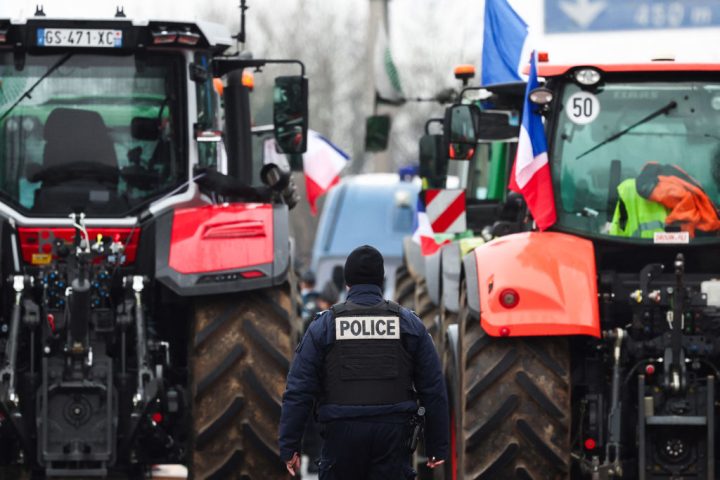In a week full of symbolism in France, the most striking image was the sight of armoured cars blocking the path of tractors outside Paris. The city’s first great wall was constructed at the end of the 12th century on the orders of Philip Augustus, but here was a new wall, of armour, erected at the command of Emmanuel Macron. They shall not pass.
And so they didn’t. A few tractors made it as far as the international market at Rungis, five miles south of Paris; their drivers were arrested and held overnight. They were released a short time before Prime Gabriel Attal announced a new set of measures to placate the farmers: stacks of cash and a promise to put the pride back into farming.
Macron appears to take a perverse delight in provoking his subjects, riling them, mocking them, patronising them
The offer has been accepted by the two biggest unions, which announced it was ‘suspending’ the protest, though they have warned the government they will be back if the pledges are not honoured. Some farmers have refused to lift their blockades though. For them it’s not about the money, it’s about the ceaseless degradation of their industry by bureaucrats in Paris and Brussels.
But the biggest convoy of tractors, more than 150, is this morning driving away from Paris. Thirty tractors were in the initial column that set out from Agen on Monday but as they moved north through the countryside their numbers swelled.
So did the crowds who turned out to cheer on the convoy as it motored north towards the capital, as if was an army of liberation. Villagers dished out food, motorists honked their horns, and in Bergerac a priest in his clergy robes blessed each tractor as it passed. He is representative of the Catholic church in France, which has urged the government to ‘listen’ to the farmers.
The police who shadowed the tractors didn’t join in the good cheer but their sympathies nonetheless lie with the farmers. In an interview this week, Rudy Manna, a spokesman for one of the police unions, said: ‘They need to know that the cops of France support this movement’.
Many of the police and gendarmes come from the countryside; they see the distress first-hand. According to Manna, they understand ‘that these farmers can’t take it any more’. Millions of French can’t take any more of this ruling elite, described by one prominent conservative commentator recently as ‘little grey men who understand nothing about France’.
No one is more ignorant than Emmanuel Macron. As the farmers barbecued brie and sausages by the side of the motorways on Tuesday evening, the president in all his finery attended a state banquet at the royal palace in Sweden. He and his host, Carl XVI Gustaf, looked like men without a care in the world. The king’s wife wore a tiara of yellow gold adorned with white pearls – a gift from Emperor Napoleon I to his first wife.
Footage of the banquet provoked a mix of outrage and bewilderment in France. Hobnobbing with royalty when the country is in revolt! Has the man no sense of shame, no sense of history? But throughout his presidency, Macron has appeared to take a perverse delight in provoking his subjects, riling them, mocking them, patronising them.
Last year, at the height of the massive street protests against the government’s pension reforms, the noted historian Emmanuel Todd was asked what he thought of President Macron. ‘He reminds me of those excited children who are testing the limits, expecting an adult to stop them,’ he said. ‘What would be good, would be if French people became adults and stopped the Macron child.’
To be fair to the French, many have tried to stand up to their president: the Yellow Vests, the transport workers in 2019, the 200,000 who protested against his Covid passport, the vast numbers who demonstrated last year, the farmers – not to mention the teachers, who staged a walkout on Thursday over pay and conditions.
But to no effect. Macron believes he was born to rule: last year he expressed his irritation that the constitution limited a president to two consecutive terms. As it is, there are more than three years left on his second mandate, plenty of time for him to keep testing the limits of the French.
One of the placards that adorned the tractors in the column that traversed France this week read ‘Paris, we’re on our way’. They didn’t quite get there, but one can’t help feeling they will be back before long.







Comments